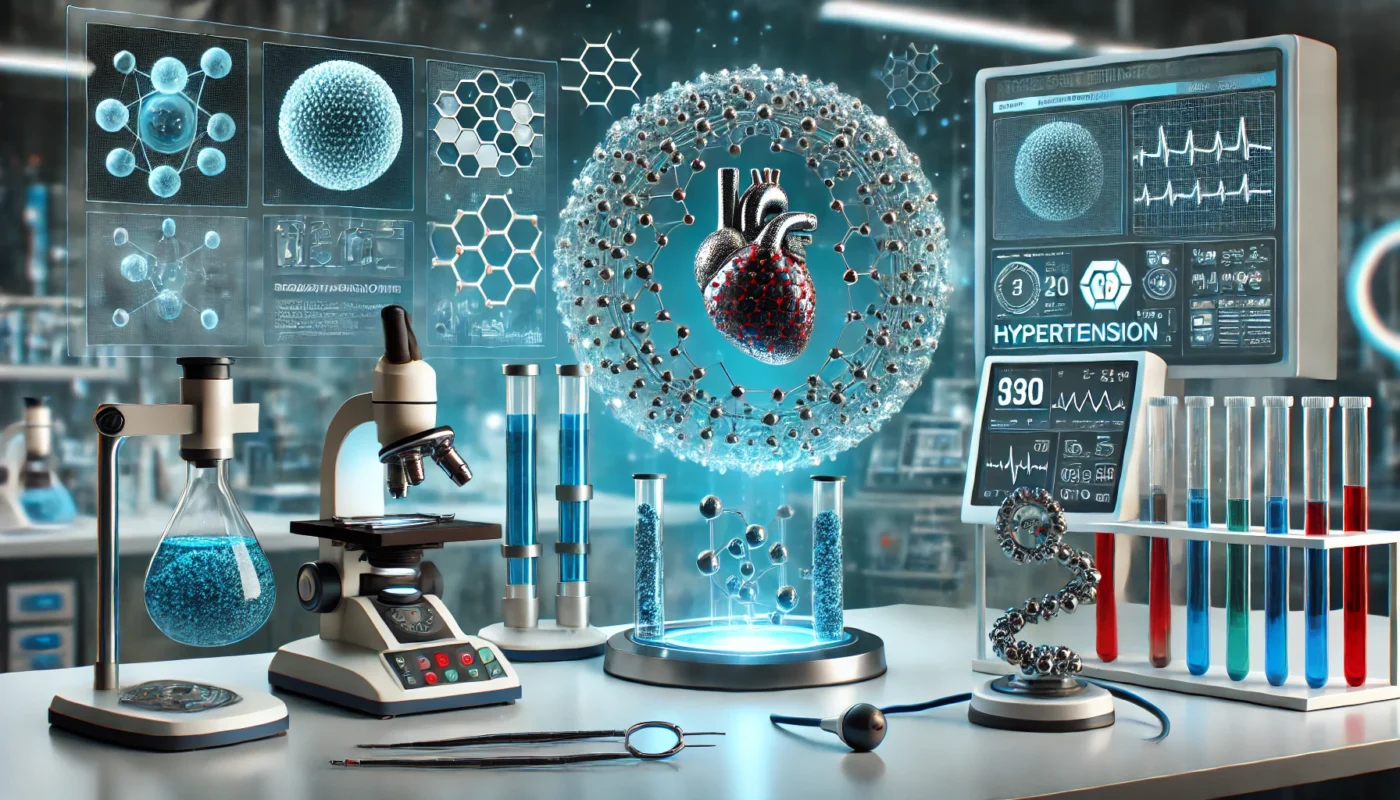Hypertension, or high blood pressure, is a global health crisis affecting over 1.28 billion adults, according to the World Health Organization (WHO). Despite the availability of effective medications and lifestyle interventions, managing hypertension remains a challenge for many patients due to issues such as medication adherence, side effects, and limited efficacy in resistant cases. Emerging technologies, particularly nanotechnology, are revolutionizing the field of medicine by offering innovative solutions for diagnosis, drug delivery, and disease monitoring. In hypertension management, nanotechnology—through its application in nanomedicine—holds the promise of improving treatment outcomes by enhancing drug efficacy, reducing side effects, and enabling personalized care. This article explores how nanotechnology is advancing hypertension management and its potential to transform cardiovascular health.
Tag Archives: Cardiovascular Health
Hypertension, commonly known as high blood pressure, is a significant global health concern, affecting over 1.28 billion people worldwide according to the World Health Organization (WHO). While salt has long been vilified as a primary dietary contributor to hypertension, recent research points to another hidden culprit: sugar. Excessive sugar consumption, particularly from added sugars in processed foods and beverages, is increasingly recognized as a major factor in the development and progression of hypertension. This article explores the relationship between sugar and high blood pressure, the physiological mechanisms involved, and practical strategies to reduce sugar intake for better heart health.
Hypertension, or high blood pressure, is a leading cause of cardiovascular disease, stroke, and kidney failure, affecting over 1.28 billion adults worldwide, according to the World Health Organization (WHO). While traditional management strategies such as medication, diet, and exercise are essential, growing evidence highlights the surprising role of companion animals in supporting heart health. Pets, particularly dogs and cats, provide emotional comfort, promote physical activity, and reduce stress—key factors that contribute to blood pressure regulation. This article delves into the science behind the calming effects of companion animals and explores their benefits for individuals managing hypertension.
Hypertension, or high blood pressure, is one of the leading causes of cardiovascular disease worldwide, affecting over 1.28 billion adults, according to the World Health Organization (WHO). While factors like diet, physical activity, and stress are well-established contributors to hypertension, an emerging area of interest is the role of gut health. The gut microbiome—an ecosystem of trillions of microorganisms—plays a vital role in regulating various aspects of health, including blood pressure. Probiotics, live beneficial bacteria found in certain foods and supplements, are increasingly recognized for their potential to manage hypertension.
Hypertension, or high blood pressure, is a chronic condition affecting millions worldwide. It is a leading risk factor for heart disease, stroke, and kidney damage. While dietary adjustments are critical in managing hypertension, the role of artificial sweeteners in this equation is less well understood. Often promoted as healthier alternatives to sugar, artificial sweeteners are ubiquitous in diet sodas, sugar-free snacks, and other low-calorie products. But do these sugar substitutes help or hinder those with high blood pressure? This article examines the surprising impact of artificial sweeteners on hypertension, exploring the pros and cons to help you make informed dietary choices.
Hypertension, or high blood pressure, is a global health challenge affecting nearly half of the adult population, according to the World Health Organization (WHO). Managing hypertension is essential to reducing the risk of cardiovascular disease, stroke, and kidney damage. Diet plays a crucial role in regulating blood pressure, and in recent years, low-carbohydrate diets, including ketogenic (keto) eating patterns, have gained popularity for weight loss and metabolic health. However, their impact on hypertension remains a topic of debate. This article examines the relationship between low-carb diets and blood pressure, exploring whether these eating patterns help or hurt individuals managing hypertension.
Hypertension, commonly referred to as high blood pressure, affects nearly half of adults globally and is a major risk factor for heart disease, stroke, and kidney failure. While medications and lifestyle changes like exercise and stress management are often prescribed for managing hypertension, dietary choices are equally impactful. Among these, fermented foods like kimchi, sauerkraut, miso, and yogurt have gained attention for their potential in regulating blood pressure. These foods, rich in probiotics and bioactive compounds, support cardiovascular health through mechanisms such as gut microbiome modulation, inflammation reduction, and improved vascular function. This article explores the role of fermented foods in hypertension management, backed by scientific evidence.
Hypertension, or high blood pressure, is a silent yet prevalent health condition that affects over 1.28 billion adults worldwide, according to the World Health Organization (WHO). As a leading cause of cardiovascular diseases, stroke, and kidney failure, managing hypertension is a global health priority. Among various lifestyle interventions, the Mediterranean diet has emerged as a highly effective and sustainable strategy for controlling blood pressure and promoting overall heart health. Inspired by the traditional eating habits of countries bordering the Mediterranean Sea, this diet emphasizes whole, nutrient-rich foods and has been extensively studied for its cardiovascular benefits. This article explores why the Mediterranean diet is an excellent choice for managing hypertension and how it can be incorporated into daily life.
Hypertension, or high blood pressure, is a chronic condition affecting nearly half of the global adult population, according to the World Health Organization (WHO). Often referred to as the “silent killer,” hypertension is a leading risk factor for heart disease, stroke, and kidney failure. While medications and lifestyle changes are fundamental for managing this condition, dietary interventions have gained widespread attention. Among these, leafy greens like spinach, kale, arugula, and Swiss chard stand out as nutritional powerhouses that support healthy blood pressure. Rich in essential nutrients like potassium, magnesium, and nitrates, these vegetables offer natural ways to regulate blood pressure and improve cardiovascular health. This article delves into the science behind the role of leafy greens in hypertension management and offers practical tips for incorporating them into your diet.
Hypertension, or high blood pressure, is a chronic condition affecting nearly half of all adults worldwide and is a major risk factor for heart disease, stroke, and kidney failure. Proper hydration is essential for maintaining cardiovascular health, but not all beverages affect blood pressure in the same way. Tea and coffee, two of the world’s most popular drinks, have long been scrutinized for their roles in hypertension management. Both caffeinated and non-caffeinated options offer potential benefits and drawbacks, depending on factors such as preparation, composition, and individual response. This article explores the effects of tea and coffee on hypertension, focusing on their potential to help—or harm—blood pressure regulation.










